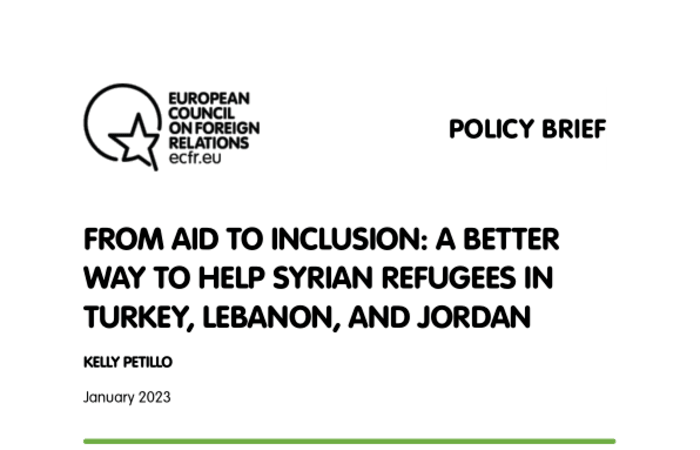From aid to inclusion: A better way to help Syrian refugees in Turkey, Lebanon, and Jordan – Syrian Arab Republic

Kelly Petillo
Programme Coordinator, Middle East and North Africa programme
Summary
-
The number of Syrian refugees attempting to enter Europe has doubled in the last two years.
-
This shift is driven by growing hostility towards Syrian refugees in host states Turkey, Lebanon, and Jordan.
-
Governments in these countries are ratcheting up the political rhetoric and deploying new ways to force Syrians to return.
-
Home-grown economic and social pressures, and problems caused by the pandemic and Russia’s war on Ukraine, contribute to these tensions.
-
Europeans’ support for Syrian refugees remains humanitarian-led and short-termist.
-
The EU and its member states should switch to a longer-term ‘inclusion’ approach that helps Syrians live in dignity in their host countries.
-
This new approach would also benefit local communities, as well as discourage Syrians from making the dangerous journey to Europe.
Introduction
Nearly 12 years since Syria’s civil war began, the eyes of the world have shifted away from the country. No political solution is in sight. But while the European Union and its member states have turned their attention to other problems, there is no such luxury for Syrian refugees and the countries to which they have fled. Now numbering 5.4 million people in total, the vast majority of Syrian refugees remain stuck in Turkey, Lebanon, and Jordan. Economic strife, political turmoil, and resource scarcity in these countries have generated “crises within crises”, whereby global food supply shortages caused by Russia’s invasion of Ukraine dramatically contribute to inflation-related pressures that can aggravate existing inequalities [1].
Turkey, Lebanon, and Jordan initially showed generosity towards Syrians escaping Bashar al-Assad. However, security and economic conditions in Syria remain dire, meaning there is little to no prospect of large numbers of people going back. Repeated UN studies have found that most, and growing numbers of, Syrian refugees want to remain where they are for the time being. This is a position that most European states claim to support; yet the situation in the three key host countries is becoming ever more strained. Driven by intensifying domestic pressures, populations and governments in these countries are increasingly turning on Syrian refugees, blaming them for domestic problems and calling for them to leave.
Europeans might feel that now is not the moment to focus their attention on Syrian refugees, and indeed that they lack the capacity to do so. European governments largely now view Syria, including its refugee dimension, as a containable situation; only a comparative trickle of Syrians are still trying to enter the EU. The bloc’s policy of channelling still-significant levels of funding to Turkey, Lebanon, and Jordan remains in place and many EU and member state officials suggest there is little need to change course.
But policymakers in the EU would be wise not to look away too quickly. Host countries’ ability to meet refugees’ needs and keep the situation stable, including in terms of blocking the onward movement of refugees to Europe – their part of the deal in exchange for European financial support – is already severely exposed. Economic difficulties, rising political and social hostility, and inadequate support are likely to push up the numbers of Syrian refugees (and also in particular of Lebanese citizens) renewing their efforts to enter Europe. This would almost certainly be augmented by new outflows from Syria itself if any of these countries lose the capacity to manage their borders. While figures remain small compared to those of Ukrainians, in 2022 there was already a significant increase in the number of Syrians travelling to Europe. According to Frontex, in 2022, at least 92,000 Syrian refugees crossed into Europe – representing almost one-third of all irregular migrants recorded and up from 46,000 crossings by Syrians the year before.
To date, European support has largely focused on meeting short-term humanitarian needs. It has not made a systematic effort to provide Syrians with adequate access to economic livelihoods and rights or legal and human rights protections. Host governments have largely prevented Syrians from receiving these out of fear of prolonging their stay or even making it permanent. However, such elements can create the conditions for a more sustainable refugee presence, whereby Syrian refugees are able to access basic services, education, and employment opportunities. This approach can also help Syrians prepare (once their home country is truly safe) to travel back and be able to remain in Syria.
To address this, Europeans do not necessarily need to send more money – something that is clearly not on the cards given wider global priorities – but they should change how they deploy their support. This policy brief argues for Europeans to transition away from the predominantly humanitarian-led approach they have followed until now. Instead, they should pursue more durable solutions, such as promoting the inclusion of Syrians into local economies and ensuring they can access more rights. Alongside this, Europeans should take stronger account of the acute needs of host populations. This new approach will help Syrian refugees live more fulfilled lives and reduce their motivation to reach European shores. In this way, Europeans will also help host populations in Turkey, Lebanon, and Jordan access stronger public services as well as better education, training, and employment opportunities.






